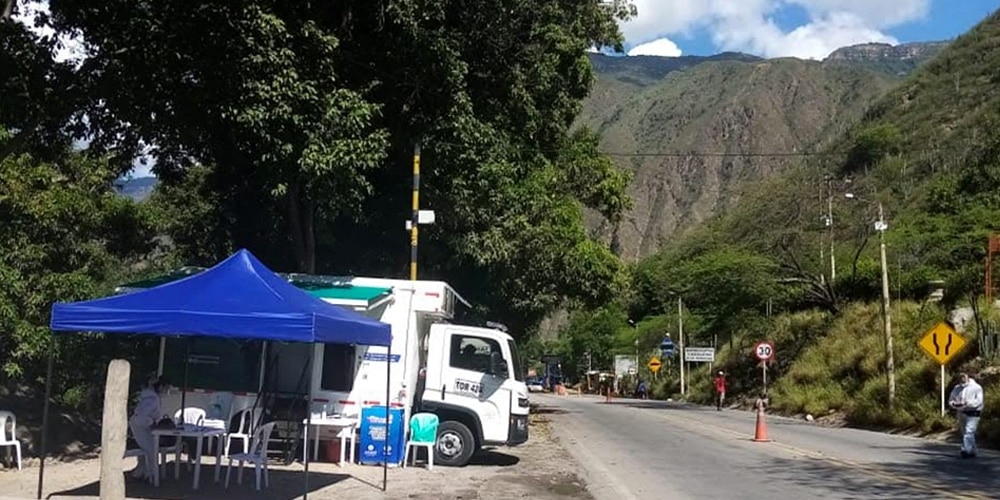
The Adventist Development and Relief Agency (ADRA) in Colombia is helping hundreds of Venezuelan migrants who are making their way back to their country on foot after losing their jobs in Colombia due to the pandemic crisis.
According to the Colombia Migration report of April 2020, more than 80,000 Venezuelans had returned home, out of the 1,825,000 spread across Colombia. The government reports that many continue to journey back home with their belongings after losing their home and a way to support their families.
Amid that situation, ADRA Colombia has set up an Adventist Mobile Unit on highways and at strategic points in cities like Bogotá, Medellín, Bucaramanga, and Cúcuta, where many travelers stop on the way to the northern border with Venezuela.
“Every week the mobile unit sets up in a pre-determined city with a working team that surveys the busiest roads and highways in communication with other agencies to better respond to cities where the demand for physical, emotional, and spiritual assistance increases,” said Jaír Florez, ADRA Colombia director. He said the journey is approximately 200 kilometers (about 125 miles), and could take four days or more traveling on foot or through challenging weather conditions.
The Adventist Mobile Unit, which is a joint project between ADRA International, ADRA Colombia, and the United States Agency for International Development (USAID), has a staff consisting of a nurse, a pre-hospital care professional, a nurse’s assistant, and a social worker. The unit sees an average of 30 persons per day from Monday through Friday on the several designated cities and road spots.
Many of the individuals tended to by the mobile unit staff are persons with trauma from the long journey on foot. Common medical challenges include blood pressure issues, different types of pain in the body, asthma, underweight, and pregnancy.
The Adventist Mobile Unit has also provided primary care in cities like Medellín and Bucaramanga for cases that require an appointment and more intensive medical care, lab work, and medicines prescribed by a physician.
Health professionals who assist persons in need said that many are grateful for the service, for meeting their physical needs but also for listening to them and giving them hope. “We strengthen them to continue on their journey during this complicated time,” said Mauricio Cancelado, a nurse who has been assisting dozens of people every week. “They find in ADRA a friend that supports them and doesn’t abandon them.”
Cancelado shared that so many thank God and the agency and the people in Colombia for the support. “They are impacted when they see evidence that someone is listening, will help them, and can provide relief as they continue their journey to Venezuela.”
In addition to the assistance to Venezuelan travelers, local community members are also being helped with medical needs during the time that the mobile unit is stationed by a park or a designated spot to assist those in need, Flórez said. “This has allowed this initiative to be seen and be more receptive among the migrant population,” he said. Also, government officials in Bucaramanga and throughout the country see ADRA as complementary to other services the government is providing.
Other organizations like the Red Cross in Colombia, Aldeas Infantiles SOS, World Vision, the Humanitarian Network, and others took part in complementary activities with ADRA Colombia, Flórez said. For example, according to Flórez, World Vision donated 1,000 hygiene kits to ADRA Colombia to be distributed to the Venezuelan travelers that ADRA’s mobile unit sees every week.
Since May 2020, more than 1,500 Venezuelans have been helped free of charge by the Adventist Mobile Unit as they travel to the border with Venezuela, Flórez said. The emergency medical response project is scheduled to end in mid-November 2020, but ADRA leaders have requested an extension without cost to donors so that more individuals can be helped.
ADRA Colombia has been working to aid Venezuelan migrants and their families since 2019, with projects including teaching hygiene practices and sexual and reproductive health, distributing food to families, sharing preventive measures against COVID-19, and more.
The original version of this story was posted on the Inter-American Division news site.